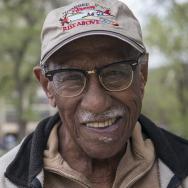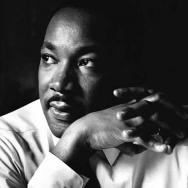Timuel Black, beloved Chicago historian, civil rights activist and University of Chicago alum, died Oct. 13 at his Hyde Park home. He was 102.
Black, AM’54, is being remembered by the University community and across Chicago for his extraordinary life and career: He marched with Martin Luther King Jr., campaigned for Chicago mayor Harold Washington, mentored a young Barack Obama and helped bring the Obama Presidential Center to the South Side.
“Like many others in the University of Chicago community, I was privileged to know Timuel Black,” said Chancellor Robert J. Zimmer. “He was a devoted student and teacher of the history of the South Side, and he lived that history over a remarkable span of 102 years, during which he helped to bring about profound changes. We are grateful for the wisdom that is his enduring gift to the city he loved, and I am personally grateful for our friendship over many years.”
As a speaker, educator and writer, Black captivated audiences in the classroom and across the city for decades. He interviewed hundreds of Chicago residents for his oral history, Bridges of Memory; authored a memoir, Sacred Ground; and regularly gave tours and lectures about his life and career.
In 2012, the University of Chicago awarded Black the William Benton Medal for Distinguished Public Service, honoring him as “one of the most influential civil rights leaders in Chicago history” and “a national voice in the cause of American justice.”
“Timuel Black dedicated his life to helping communities across Chicago, especially on the South Side,” said Derek Douglas, vice president for civic engagement and external affairs at UChicago. “His unparalleled understanding of the area’s history and people made him an outstanding advocate, a trusted counselor and a consummate community partner. He was deeply committed to educating and inspiring young people—a mission that he advanced with the University of Chicago through the creation of the Timuel D. Black Community Solidarity Scholarship.
“Tim was one of the most passionate community leaders of the effort to bring the Obama Presidential Center to the South Side, and his vision was central to that proposal’s success. Even as we mourn his loss, we know his humanitarian spirit will continue to guide us in working toward a bright future for the South Side and beyond.”
A life devoted to ‘peace and justice’
Born Dec. 7, 1918 in Birmingham, Alabama, Black was the youngest son of sharecroppers. He and his family moved to Chicago in 1919, arriving in the city in the wake of violent race riots that targeted Black residents on the South Side that summer. They settled in Chicago’s “Black Belt”—now known as Bronzeville—a neighborhood that had a dense population due to restrictive covenants that kept Black residents from living in predominantly white areas.
“Though we lived in a period of Depression, we were not depressed,” Black said in a 2014 interview. “We had a feeling that it’s going to be all right.”
Pearl Harbor was bombed on Dec. 7, 1941, Black’s 23rd birthday; two years later, he was drafted into the U.S. Army. Black endured two of the bloodiest battles of World War II—the D-Day invasion of Normandy and the Battle of the Bulge—earning four battle stars and the French Croix de Guerre.
Toward the end of World War II, a visit to the Buchenwald concentration camp changed the course of Black’s life. For Black, whose grandparents had been enslaved, confronting the evidence of Nazi atrocities inspired an irrevocable commitment to human rights.
“When we got up to Buchenwald, to see and feel and hear the cries, I was shocked,” Black recalled in a 2014 interview. “I began to feel that this could happen to anyone, and that in the long run, this is what happened to my ancestors, in an organized, systematic way. I was angry.
“I made an emotional decision that when I returned from the Army, that most of the rest of my life would be spent trying to make where I live, and the bigger world, a place where all people could have peace and justice.”
Following Dr. King to the national stage
After the war, Black attended Roosevelt University for his bachelor’s degree and then received his master’s in 1954 from the University of Chicago. He studied sociology and history, learning from renowned scholar Allison Davis, the first tenured African American professor at the University. After graduating from the University, Black taught high school in Gary, Indiana, and Chicago.
In 1955, Black first saw Martin Luther King Jr. speak on TV, and he was so moved that he flew to meet him in Montgomery, Alabama. The following year, Black and fellow members of Hyde Park’s First Unitarian Church at 56th Street and Woodlawn Avenue in Chicago invited King to deliver a sermon. To accommodate King’s growing popularity, the event had to be moved to the much larger Rockefeller Memorial Chapel on the UChicago campus.
In 1963, Black helped organize the “freedom trains” that took thousands of Chicagoans to the March on Washington. “When Dr. King came on stage and put into eloquent terms, that ‘I Have a Dream’ speech, all of us were in tears,” Black said in 2014. “We believed that dream could be fulfilled, and we left with a feeling of responsibility to the dream and to the man.”
Black spent most of his life working to fulfill King’s dream of a more equal society. As an educator and administrator, Black helped end segregation in Chicago Public Schools. In 1963, he ran for the Chicago City Council. Although Black lost the election, he generated national attention when he coined the term “plantation politics” to describe the city’s political system under Mayor Richard J. Daley.
After Dr. King’s death in 1968, Black rededicated himself to King’s activist ideals, remaining a prominent community leader. In 1983, he was part of a grassroots campaign that succeeded in electing Harold Washington as Chicago’s first Black mayor.
A mentor to generations across Chicago
Black continued to mentor aspiring politicians. In 1992, he helped Carol Moseley Braun become the first African American woman to win election to the U.S. Senate. That same year, Barack Obama—then an up-and-coming political organizer who had just moved to Chicago—met Black to get his advice about running for office. In remarks for Black’s 100th birthday, Obama recalled that he was inspired by Black’s “deep well of empathy.”
“He talked to me for hours, asking one question after another about how to build a political base on the South Side,” Black wrote his memoir, recalling their meeting at Medici on 57th in Hyde Park. “We met a number of times in fact, though I cannot recall too many of the details. I do recall how he struck me right away as very bright. He was a talented young man who was going to be ready when the doors of opportunity swung open. But he had a lot to learn. And I mean a lot.”
When Obama was elected president of the United States in 2008, Black and his wife Zenobia Johnson-Black were invited to the inauguration. “It was a great day, a day I never dreamed I would see, as magical as the March on Washington,” Black wrote in his memoir. “Now I felt that the miraculous really had happened.”
“Over his 102 years, Tim was many things: a veteran, historian, author, educator, civil rights leader and humanitarian,” Obama wrote in a statement. “But above all, Tim was a testament to the power of place, and how the work we do to improve one community can end up reverberating through other neighborhoods and other cities, eventually changing the world.”
In 2014, Black was part of the proposal led by the University of Chicago to bring the Obama Presidential Center to the South Side, which Black hoped would serve as “a place of information and inspiration.”
Black served as a source of inspiration for many who knew him. Well into his late 90s, Black led tours about the history of Bronzeville that helped younger generations learn about his life and work, as well as that of Dr. King.
“Timuel Black has been the indispensable teacher, mentor, historian and champion of Chicago's South Side, over the balance of his 100-plus years,” said Assoc. Prof. Adam Green, a scholar of African American history. “His books epitomized the Black Migration saga of Chicago. But more than his research and writings, it was his generosity, acute appetite for relationships, and fierce hunger for justice that made Timuel Black the cherished sage of Black Chicago.”
Noting Black’s many productive encounters with all kinds of people—from concentration camp survivors to politicians—Green added: “He learned the language of power, in order to speak truth to it. He traveled by the light of struggle, so that he and others could walk the path to freedom. Our present knowledge of, and pride in, the lore and meaning of Bronzeville would not exist without Tim's wisdom and leadership. He will be sorely missed, but never forgotten.”
Honoring Black’s memory
In 2019, the University celebrated Black’s 100th birthday with an event that honored the contributions he made to the South Side, and featured music from his favorite genre: jazz.
Last year, the Civic Knowledge Project, a program in the University’s Office of Civic Engagement, established the Timuel D. Black Community Solidarity Scholar Fund in his honor. The annual award will be given to an outstanding University undergraduate or graduate student who exemplifies Black’s spirit.
“I have been consistently impressed by Timuel’s ability for growth; he’s not some historical figure trapped in another time,” said Bart Schultz, director of the Civic Knowledge Project, who has partnered with Black on tours of the South Side for more than 21 years. “Whether it be community issues or social and racial justice issues, he’s always evolving. When I’m with him, I feel like he’s the wisest of elders, but forever young and always ready to help—or as he puts it: ‘make this world a better place.’”
Black is survived by Zenobia, his wife of nearly 40 years; and his daughter Ermetra. He was preceded in death by his sons, Timuel Kerrigan Black and Anthony Said Johnson. Black’s funeral service will be available via webcast at 10 a.m. on Oct. 22. A public memorial service is scheduled for Dec. 5 at Rockefeller Memorial Chapel.

